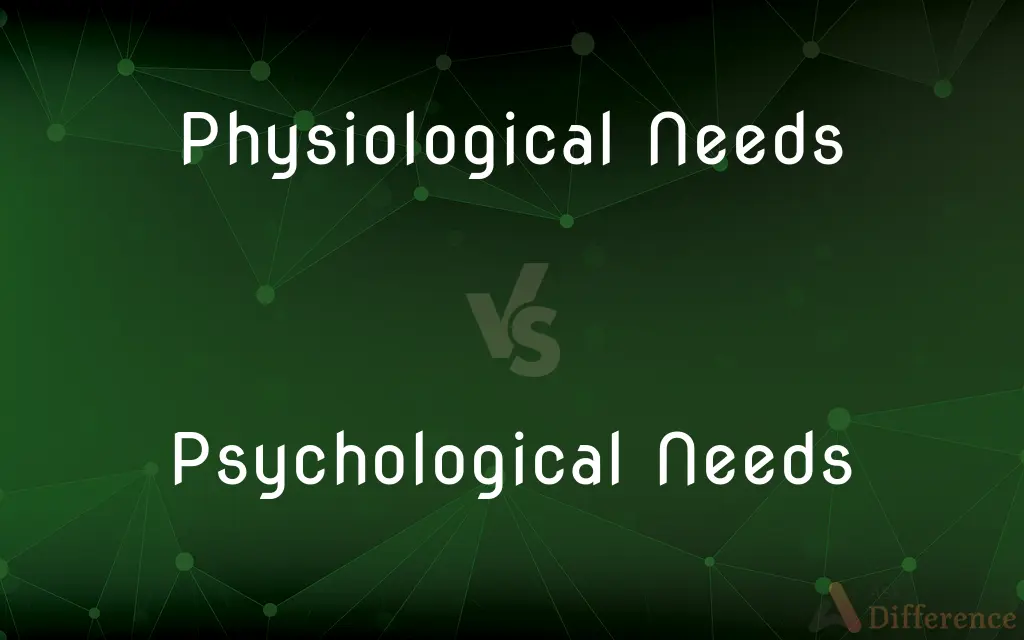Physiological Needs vs. Psychological Needs — What's the Difference?
Edited by Tayyaba Rehman — By Fiza Rafique — Published on November 23, 2023
"Physiological Needs are basic physical survival needs (e.g., food, water), while Psychological Needs pertain to mental well-being (e.g., love, esteem)."

Difference Between Physiological Needs and Psychological Needs
Table of Contents
ADVERTISEMENT
Key Differences
Physiological Needs are the most basic human necessities required for survival, such as food, water, and shelter. Without these, the human body cannot function properly or sustain life. Psychological Needs, however, are crucial for mental health and include elements like acceptance, understanding, and feeling valued, which aren't essential for physical survival but are critical for emotional well-being.
Physiological Needs come first in the hierarchy of needs because they're related to the body's physical demands like breathing, nutrition, and sleep. Without meeting these, it's impossible to pursue any other requirement, making them fundamental for existence. In contrast, Psychological Needs involve our interactions, thoughts, emotions, and state of mind, playing a vital role in defining our quality of life and overall happiness.
Physiological Needs, when unmet, can have immediate and severe physical health implications, like malnutrition or illness, because the body relies on these for its basic operational functions. Psychological Needs, if not satisfied, might not lead to physical symptoms right away but can cause long-term mental health issues like depression, anxiety, and low self-esteem.
Physiological Needs are often met through tangible, measurable means like eating when you're hungry or seeking shelter in extreme weather conditions. These are universal and consistent among all humans. Psychological Needs, on the other hand, are more complex and subjective, varying greatly from person to person based on individual experiences, culture, and personality.
Physiological Needs don't require introspection or deep self-understanding to be recognized; they're primal and felt through physical sensations. Conversely, Psychological Needs require self-awareness and introspection, as recognizing a need for love, esteem, or belonging involves understanding one's emotions and mental state.
ADVERTISEMENT
Comparison Chart
Nature
Physical
Mental
Examples
Food, water, sleep
Love, self-esteem, belonging
Consequences of Deprivation
Immediate physical health issues
Long-term mental health issues
Fulfillment
Tangible actions
Introspective understanding
Universality
Consistent among all humans
Varies by individual
Compare with Definitions
Physiological Needs
The physical prerequisites for sustaining life.
In times of famine, Physiological Needs become the primary concern.
Psychological Needs
Mental health necessities like love and belonging.
Social gatherings help meet our Psychological Needs for community.
Physiological Needs
Fundamental physical health requisites.
Doctors check to ensure Physiological Needs are met before proceeding.
Psychological Needs
Imperatives for personal development and fulfillment.
Achieving goals satisfies a deep Psychological Need for success.
Physiological Needs
Bodily demands including food, water, and sleep.
During the hike, we packed enough supplies to satisfy our Physiological Needs.
Psychological Needs
The emotional requisites for a fulfilling life.
Humanitarian efforts often address both Physiological and Psychological Needs.
Physiological Needs
Essential requirements for human survival.
Without access to clean water, our basic Physiological Needs are not met.
Psychological Needs
Essential emotional and mental well-being requirements.
Feeling understood fulfills a crucial Psychological Need.
Physiological Needs
Necessities that maintain bodily functions.
Proper shelter is a Physiological Need that protects us from the elements.
Psychological Needs
Demands for mental stability and emotional health.
Counseling supports people in addressing unmet Psychological Needs.
Common Curiosities
Do Physiological Needs affect one's emotions?
Indirectly, yes. Unmet Physiological Needs can cause stress or discomfort, influencing emotions.
Are Physiological Needs the same for everyone?
Yes, all humans have the same basic Physiological Needs, like food and water, whereas Psychological Needs can vary individually.
Are Psychological Needs learned or innate?
Some Psychological Needs are innate, like affection, while others may develop based on life experiences.
Are Physiological Needs more important than Psychological Needs?
Both are important, but Physiological Needs must be met first for survival, followed by Psychological Needs for mental well-being.
How can one fulfill their Psychological Needs?
Psychological Needs are met through relationships, self-care, personal growth, and achieving life goals.
What happens if Psychological Needs are ignored?
Neglecting Psychological Needs can lead to mental health issues, like anxiety or depression.
Can fulfilling Psychological Needs improve quality of life?
Absolutely, meeting Psychological Needs significantly enhances overall happiness and life satisfaction.
Is love a Physiological or Psychological Need?
Love is a Psychological Need, crucial for emotional well-being and social development.
Are Physiological Needs limited to food and water?
No, they also include sleep, shelter, and other necessities for physical health and survival.
Can Psychological Needs impact physical health?
Yes, unmet Psychological Needs can lead to stress or depression, affecting physical health.
Do animals have Physiological and Psychological Needs?
Yes, animals have both, but human Psychological Needs are more complex due to advanced cognition.
Can Physiological Needs be permanently satisfied?
No, Physiological Needs like hunger and thirst reoccur regularly and need continual fulfillment.
Can you prioritize Psychological Needs over Physiological Needs?
Not usually, as the body requires Physiological Needs to function before one can focus on Psychological Needs.
Why are Psychological Needs sometimes hard to identify?
Psychological Needs are often intangible and subjective, requiring self-awareness and introspection to recognize.
How do Physiological Needs influence behavior?
They drive basic survival behaviors, like seeking food when hungry or water when thirsty.
Share Your Discovery

Previous Comparison
Best Regards vs. Yours Faithfully
Next Comparison
Twin Bed vs. Double BedAuthor Spotlight
Written by
Fiza RafiqueFiza Rafique is a skilled content writer at AskDifference.com, where she meticulously refines and enhances written pieces. Drawing from her vast editorial expertise, Fiza ensures clarity, accuracy, and precision in every article. Passionate about language, she continually seeks to elevate the quality of content for readers worldwide.
Edited by
Tayyaba RehmanTayyaba Rehman is a distinguished writer, currently serving as a primary contributor to askdifference.com. As a researcher in semantics and etymology, Tayyaba's passion for the complexity of languages and their distinctions has found a perfect home on the platform. Tayyaba delves into the intricacies of language, distinguishing between commonly confused words and phrases, thereby providing clarity for readers worldwide.












































